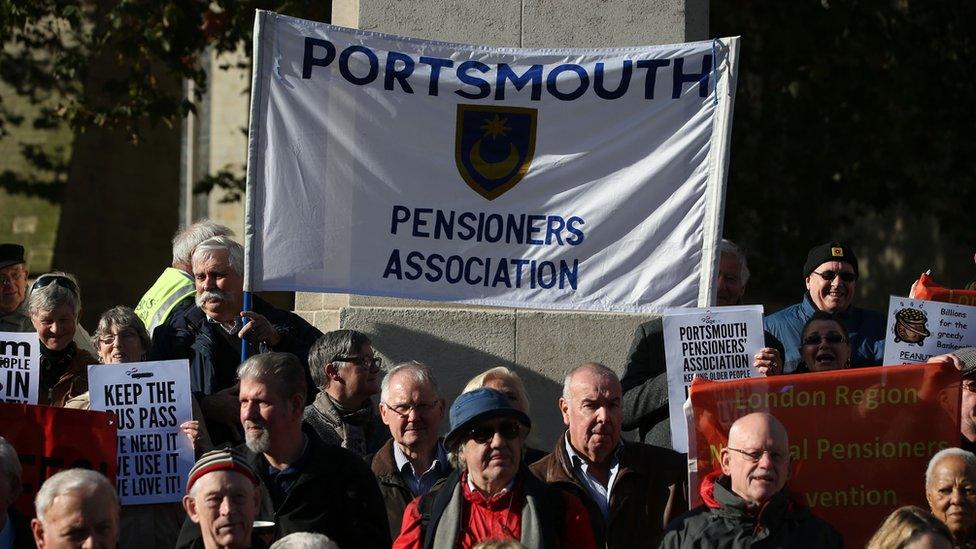State pension triple-lock should be scrapped, say MPs
- Published

Pensioners demonstrated in London last week, in defence of the triple-lock
The "triple-lock" on state pensions - which has protected the incomes of the older generation since 2010 - should be scrapped, a committee of MPs has said.
The triple-lock guarantees that pensions rise by the same as average earnings, the consumer price index, or 2.5%, whichever is the highest.
The Work and Pensions Committee said continuing with it was "unsustainable" and "unfair" on younger families.
The government said it was committed to the triple-lock until 2020 at least.
Historically, pensions were linked to inflation rather than earnings, which reduced pensioner incomes relative to those of the working population.
As a result of triple-lock policy, the state pension has risen by a relatively generous £1,100 since 2010, with an increase of 2.9% in April this year.
'Unsustainable'
However, MPs said that while pensioners had done well out of the triple-lock, young people and working-age families had suffered unfairly.
So-called Millennials, born between 1981 and 2000, face being the first generation in modern times to be financially worse off than their predecessors, they added.
MPs said the rising cost of the state pension - £98bn in the last tax year - was now unsustainable.
Instead of the triple-lock, they say the new state pension and basic state pension could be linked simply to average earnings.
They say a formula should also be included to protect pensioners during periods when earnings lag behind price inflation.
In those periods, pensioners would get an above-earnings increase so that their purchasing power did not decline.
Former Work and Pensions Secretary Iain Duncan Smith defended the introduction of the triple-lock in 2010 because at the time pensioners were "most likely to be in poverty".
But he told BBC Radio 5 live, this year alone the policy would cost £18bn more than was originally estimated so it was right to re-examine it.
Mr Duncan Smith added: "We still want their pension to grow, but it's the question of the rate of growth that is costing so much and that now needs to be reviewed."

The report said there was a "trade-off" between increasing the amount of state pension that people get and setting the age at which people receive it.
Simply increasing the state pension age risked further disadvantaging people who may already be worse off and have lower life expectancies.
Labour MP Frank Field, the chairman of the committee, said that at the same time as tightening their belts, young people were being asked to support a group that has "fared relatively well in recent years".
"They've accepted that unfairness so that we could largely eliminate pensioner poverty," he told the BBC.
"Fairness now means that the pendulum swings back in favour of working families, so they do not continue to have cuts - real cuts - in living standards, while we further advance the interests of pensioners."
'Phoney conflict'
A spokesperson for the Department of Work and Pensions said: "We want to ensure economic security for people at every stage of their life, including retirement. We are committed to the triple lock which is protecting the incomes of millions of pensioners."
Dot Gibson, general secretary of the National Pensioners Convention, said pensioners were "being blamed for the problems faced by today's younger generations".
"This phoney conflict is being used as a smokescreen in order to cut back on the welfare state," she said.
"The housing crisis hasn't been caused by pensioners but because in Britain we sold off council houses, we haven't been building enough affordable homes, wages and employment are low and insecure and an economy built on house-price inflation simply cannot be sustained.
"This is what needs to be addressed."